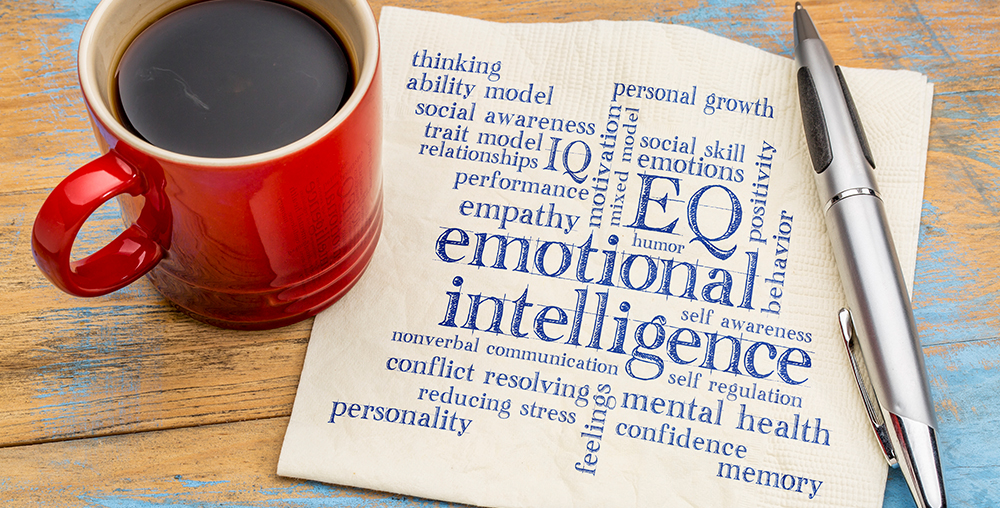
By Ann Flannigan Petry
The chief executive of a commercial real estate firm was usually easy-going—except when one of his staff brought bad news. Then he’d become furious and yell. His behavior was aggressive. While no one told him directly, everyone who worked for him agreed: he was a nightmare of a boss.
That CEO lacked emotional intelligence. Leaders with emotional intelligence (or EI) manage their reactions and keep distressing emotions under control. They can connect with others in a way that builds trust and rapport.
Crucially, emotionally intelligent leaders stay calm and focused in the most trying times. They are clear-headed and fully take in what’s happening. They process information and respond nimbly, even in a crisis.
Everyone has the innate ability to strengthen their emotional intelligence. It just takes recognizing and practicing it.
The ability to navigate emotions (yours and others’) effectively is a crucial skill for leaders. EI plays a pivotal role in your leadership effectiveness and team dynamics. Leaders with emotional intelligence are more likely to make good decisions, build strong relationships, and navigate challenges with resilience.
What is Emotional Intelligence?
Emotional intelligence is our capacity to recognize, understand, and manage our emotions, empathize with others, and effectively navigate relationships.
According to Daniel Goleman, psychologist and award-winning author of Emotional Intelligence― and one of Harvard Business Review’s ten must-reads on leadership, there are four key domains of emotional intelligence:
- Self-awareness
- Self-management
- Social awareness
- Relationship management
Practicing these skills is fundamental to harnessing the power of EI. Why is emotional intelligence so important for your leadership and organization? Emotionally intelligent leaders:
- Build strong, more collaborative teams, including in hybrid or remote work situations.
- Experience lower turnover and higher employee engagement rates.Are better equipped to support their employees’ well-being and mental health.
Let’s look at each domain more closely.
Self-Awareness
Self-awareness starts with understanding our emotions and their impact on our thoughts, behaviors, and actions. It is the cornerstone of emotional intelligence.
Our self-awareness shapes how we perceive and respond amidst change and disruption. When we are self-aware, we make better decisions and avoid letting our emotions cloud our judgment.
In the broadest sense, self-awareness refers to our capacity for introspection, to be aware of our thoughts, reflect on them, and be aware of awareness itself (sometimes called “meta-cognition”). By reflecting, we gain a deeper understanding of ourselves.
We need self-awareness. Without it, we struggle to manage our impulses, motivations, and reactions. The absence of self-awareness means we let our habits and biases take over and run on autopilot. We end up reacting rather than responding. Being reactive doesn’t allow us to consider the situation and choose the best response.
Research by Korn Ferry Hay Group found that leaders with strength in self-awareness had teams with high energy and high performance 92% of the time. In sharp contrast, leaders low in self-awareness created adverse climates 78% of the time.
One way to hone your self-awareness is with “micro-practices” of mindfulness, such as taking a three-minute breathing space. This short yet powerful practice offers a quick way to purposefully engage our minds and strengthen the self-awareness muscle–like doing a mental push-up. Set your timer for three minutes if that helps.
Self-Management
Think about the people you know who are calm under pressure and can manage their emotions even amidst stress. Chances are these people excel at emotional self-management or emotional balance. It doesn’t mean repressing emotions. On the contrary, it means recognizing our emotions and being able to modulate them depending on the situation, even when emotions are intense.
Self-management, or self-regulation, means you can find balance even amidst challenging situations. Think about how essential this is in today’s rapidly changing workplace.
Emotional self-management matters because:
- Cognitive science shows that being upset hinders our ability to focus and respond with agility.
- Emotional upset sabotages our ability to make good decisions.
- Leaders’ emotions are contagious.
- Leaders that manage their emotions well have better business results.
- People are far more likely to remember negative encounters with a boss than positive ones.
When we, as leaders, demonstrate emotional balance, it helps create a collegial culture and respect within our teams, departments, and organization. Here are some practices to strengthen emotional balance:
- Use deep breathing, mindfulness, and cognitive reframing. These practices help you stay calm and manage emotional responses.
- Tune into your body and notice when you start to feel upset. This enables you to recognize the signs of upset earlier and respond more effectively.
- Practice gratitude. Taking time to acknowledge the good in our lives helps us see things more positively and broadens our perspective.
Social Awareness
The social awareness competency means you can sense others’ feelings, consider their perspectives, and take an active interest in their welfare. At the heart of social awareness is empathy.
The underlying intent of empathy is wanting to understand another person. Not just making them believe you want to understand them, but actually caring. While the act most related to empathy is listening, you will also benefit if you take the time to ask questions.
Demonstrating empathy means showing interest in others by paying attention to what they say and then using that information to inform what you say or do.
Though empathy is needed for better understanding between people of different cultures, belief systems, or even genders, science says our brains may be wired to empathize more with people who look like us.
This brain bias toward not sensing others’ feelings when we can’t relate to them is a challenge for everyone, especially in work groups. It is often easier to label people we can’t relate to as “difficult” and write them off. Yet, with EI, we can reduce these reactions.
Many people mistakenly believe empathy—like other emotional intelligence competencies—is something we are born with or not. But that’s not true. In reality, we all can empathize with others, even if we don’t necessarily like or understand them. Researchers have discovered we have physical structures in our brain—called mirror neurons—that help us understand others’ experiences and feelings.
Good leadership requires the ability to feel the full range of human emotions and to be able to offer and receive empathy. We open the door for empathy when genuinely listening to others and becoming curious about their situation. The best leaders are empathic and caring, creating psychological safety and enabling more effective teams.
Relationship Management
The last emotional intelligence domain, relationship management, builds on the previous skills and includes teamwork, conflict management, being an inspirational leader, and intentionally coaching and mentoring others. This set of capabilities sets mediocre leaders apart from high performers.
Self-awareness, emotional balance, and empathy are foundational to effective relationships. Imagine a team leader who lacks these abilities. They might be clueless about how their abruptness, irritability, or argumentative communication style affects others.
The inevitable result is frustration and disengagement. On the other hand, when the team lead is understanding, curious, seeks input from others, and minimizes drama, things run much more smoothly, and people enjoy coming together.
5 Techniques to Develop Emotional Intelligence
Developing emotional intelligence requires intentional effort and practice. By incorporating the following practices into your daily life, you can become more emotionally intelligent and increase your leadership effectiveness.
- Practice active listening, fully focusing on the speaker and asking clarifying questions.
- Put yourself in others’ shoes and acknowledge their feelings.
- Pay attention to non-verbal and verbal communication. Are you sending the signals you intend to?
- Don’t be afraid to apologize when you make a mistake; it lets others know you are human.
- Take breaks from digital devices to be more present in the moment.
Strengthening your emotional intelligence is one of the most valuable things you can invest in. Your relationships will be stronger, and you will be much more effective in getting work done. Professional development is one resource that can provide you with the support, guidance, and skills to further develop your emotional intelligence and become a more effective and emotionally intelligent leader at your organization.

Ann Petry is a Managing Partner at Owlish Labs. Her expertise in leadership development and emotional intelligence, along with her warmth and humor, make her a trusted partner. Prior to her current work, Ann served as Chief Products Officer at Goleman EI, where she led the product development and operationalization of Daniel Goleman’s leadership and coach training programs. She is certified in Emotionally Intelligent Leadership and Executive Coaching, Appreciative Inquiry, Associate Certified Coach from the International Coach Federation, and advanced training in Mindfulness-Based Stress Reduction (MBSR) and Mindfulness-Based Cognitive Therapy (MBCT)